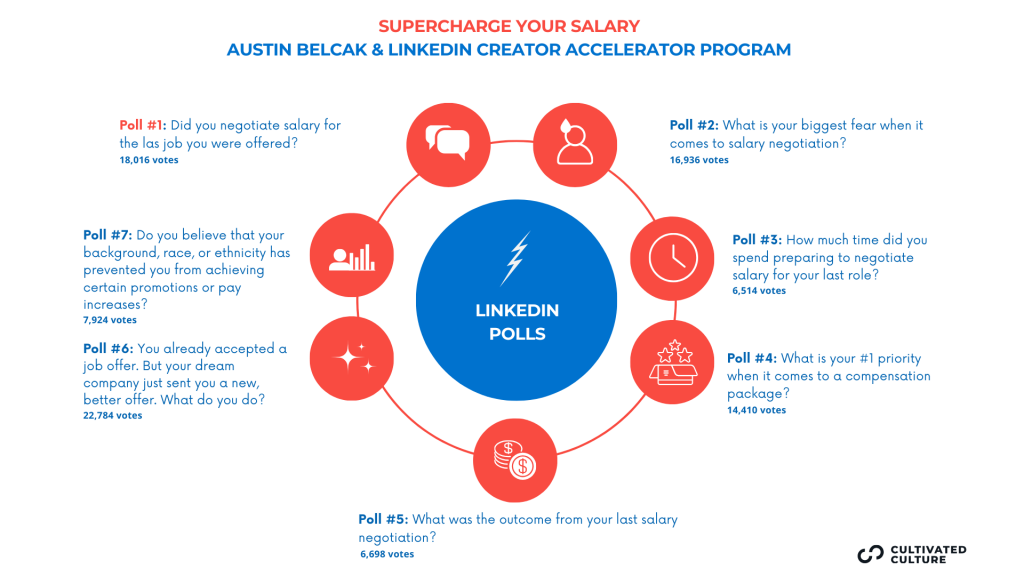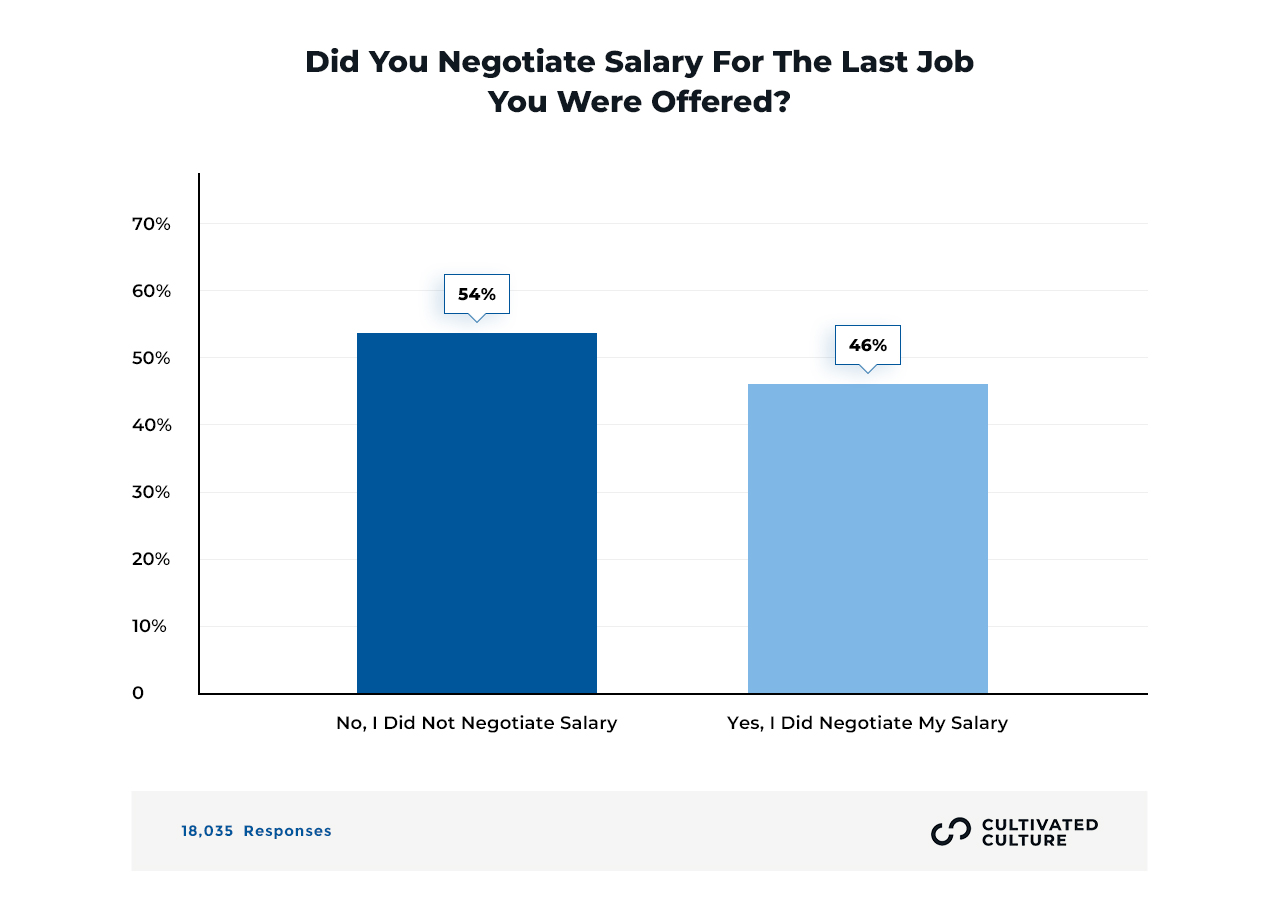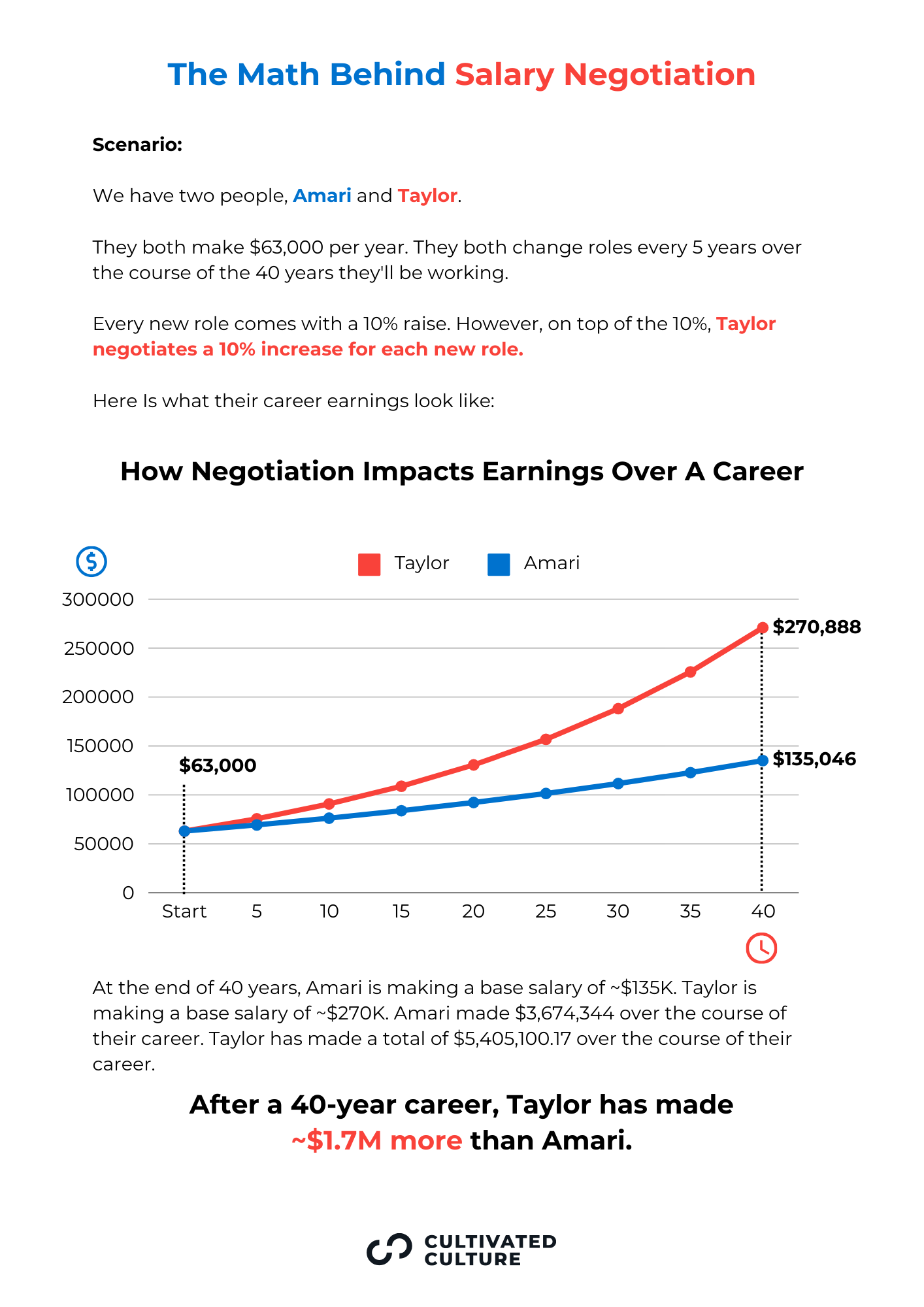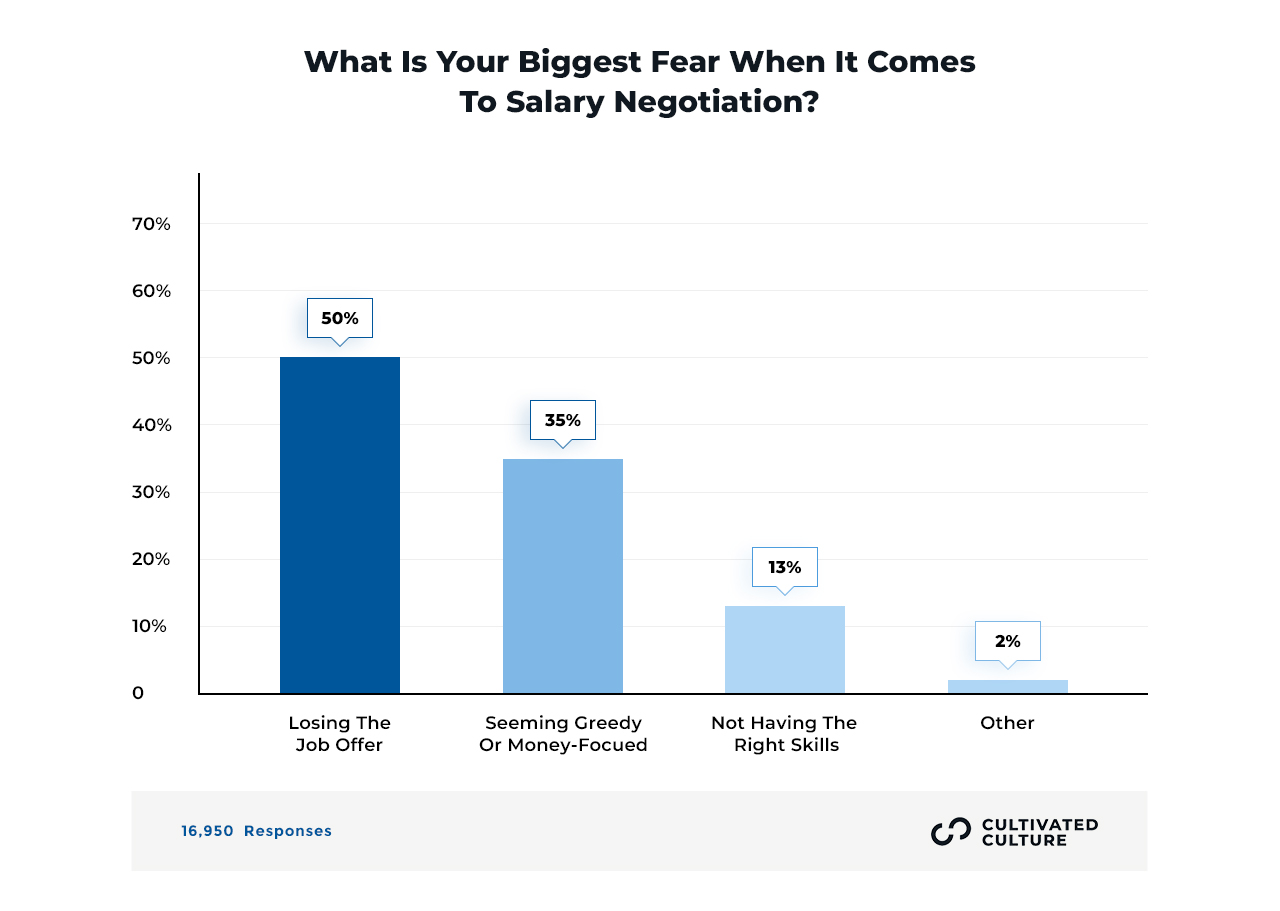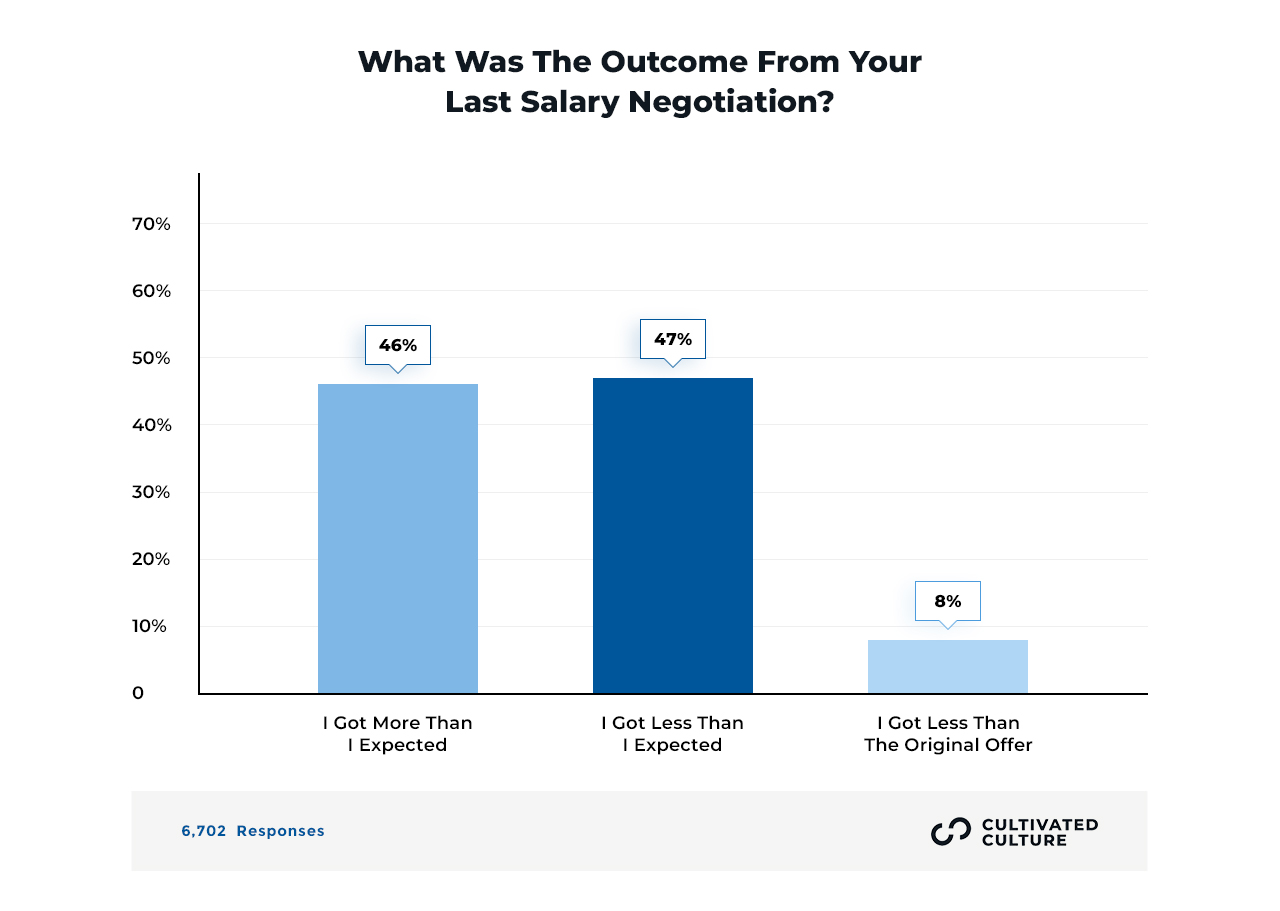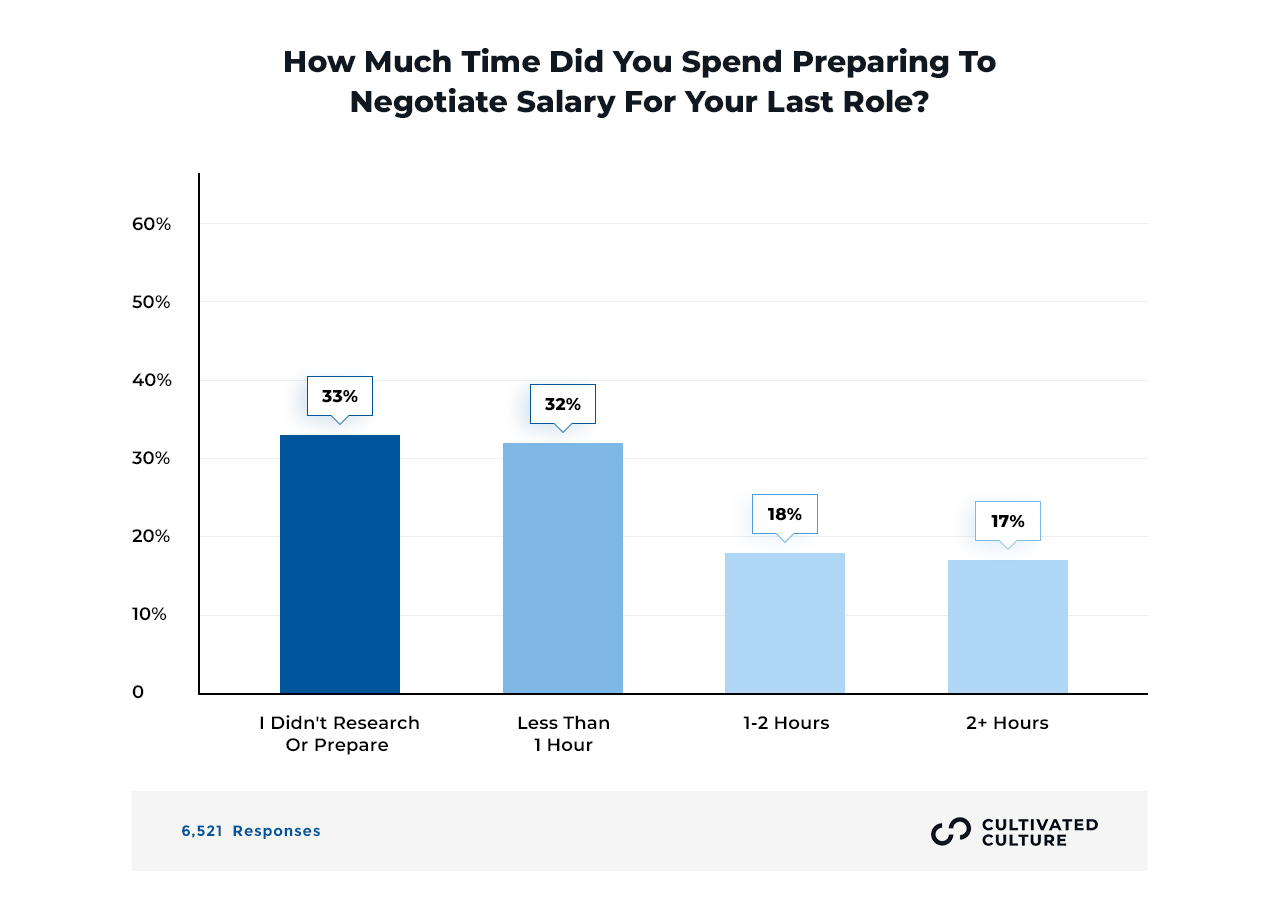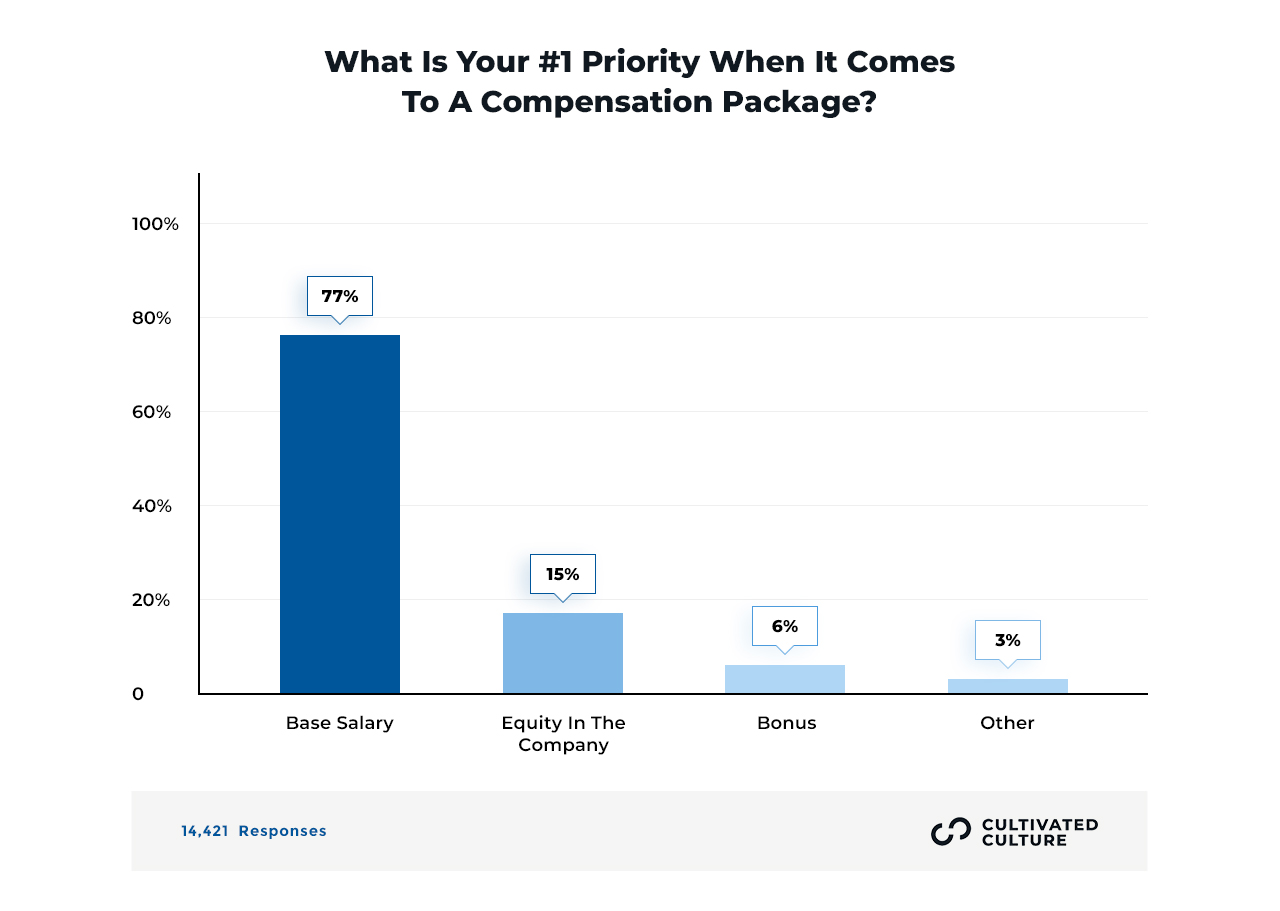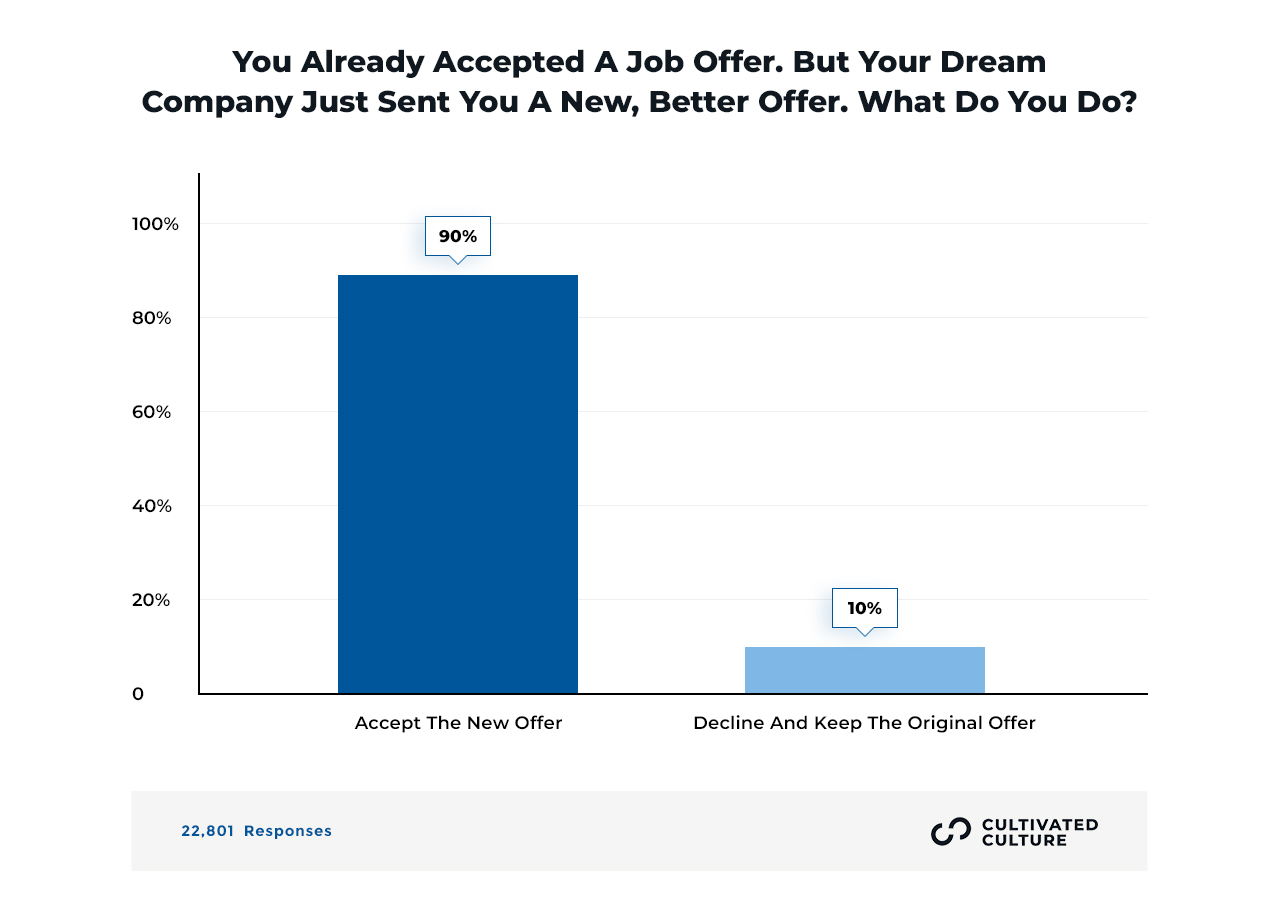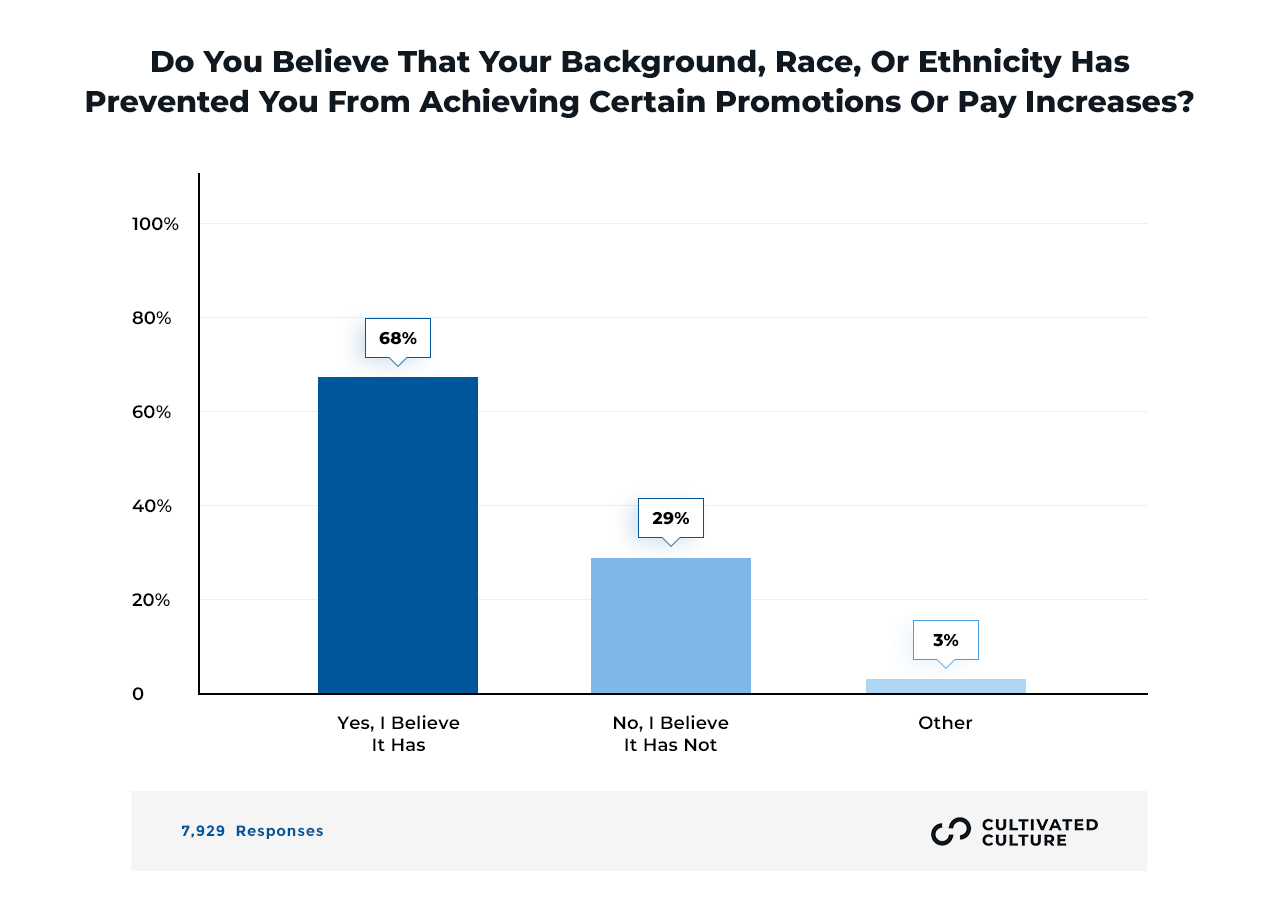If you don't know how to negotiate salary and the idea of doing it scares you to death? You're not alone.
In a survey we've conducted with 18,000+ voters, over half said they didn't negotiate salary for the last job they were offered.
Unfortunately, this means leaving money on the table: not negotiating salary can cause people to miss out on $600,000+ over the course of their careers!
But what are most people afraid of? Why don't they negotiate? What do they want when they do negotiate?
To answer these questions, we pulled the data from 7 LinkedIn polls hosted by Austin Belcak in partnership with LinkedIn's Creator Accelerator Program to find out what people's biggest fears around salary negotiations and how those who are negotiating their salaries are conducting these conversations.
After analyzing 93,000+ answers, we've built a comprehensive guide on how to negotiate salary that helps job-seekers in:
- Overcoming the fears and blockers around salary negotiation
- Performing top-tier salary research
- Negotiating salary during the interview process
- Navigating the conversation to maximize earnings
- + A whole lot more!
We're not only sharing our findings here; we're also sharing our winning strategies to negotiate the salary you deserve effectively.
Here's what you will find in this article:
- Salary Negotiation: A Summary Of Our Key Findings
- Where Are These Numbers Coming From?
- Breaking Down 7 Key Findings To Guide Your Next Salary Negotiation
- How To Negotiate Salary
- Salary Negotiation Resources
Let's dig in!
Salary Negotiation: A Summary Of Our Key Findings
- People who negotiate earn up to $600,000 more than those who don't, yet 54% of people didn't negotiate their salary for the last job they were offered.
- When it comes to negotiating salary, the #1 fear is losing the job offer (50% of candidates).
- While half of the candidates are afraid of losing the offer, 93% of those who negotiated their salary actually got more than the original offer.
- Still, 65% of candidates spent less than one hour preparing to negotiate, while 33% didn't spend any time at all.
- When it comes to compensation, base salary is the #1 priority for people (77% of candidates).
- After accepting an offer, 90% of candidates would still drop out if their dream company offered them a new, better offer.
- When It comes to promotions or pay increases, 68% of candidates believe their background, race, or ethnicity has prevented them from reaching these achievements.
We'll break down the data and information on all these findings in the sections below, and then share our strategies. But before we do…
Where Are These Numbers Coming From?
This data comes from a series of LinkedIn polls run by Austin Belcak, a LinkedIn Top Voice with ~1.3M followers for LinkedIn's invite-only Creator Accelerator Program.
Partnered with LinkedIn Guide to Creating, Austin has hosted a 10-week series called “Supercharge Your Salary” and ran 7 LinkedIn polls with questions about salary negotiation. Each poll received ~6K-22K responses, compounding a total of 93,282 votes in all surveys.
We've analyzed the data from each survey to bring in our insights and actionable salary negotiation tips.
Breaking Down 7 Key Findings To Guide Your Next Salary Negotiation
Let's start by analyzing the first LinkedIn poll, which shows us that…
1. 54% Of Candidates Don't Negotiate Salary
Our data shows that 54% of candidates didn't negotiate their salary for the last job they were offered.
That's crazy when you think that not negotiating your salary can potentially mean earning $600,000+ more over the course of a 40-year career.
Don't take our word for it, though. According to the Harvard Law Schools Program of Negotiation, a 25-year-old employee entering the job market at $55,000 per year will earn about $634,000 more over the course of a 40-year career, assuming annual 5% raises.
Now let's consider these factors:
- The salary average in the US is now at US $63,795 per year, according to the Social Security Administration
- Candidates who negotiate can expect a 10% to 20% pay increase when changing jobs, according to Investopedia
Now, here's where things get interesting:
If every salary negotiation meets the lower end of range, we're looking at an astonishing ~$1.7M+ difference over the course of a 40-year career.
Check out the chart below where we break out the math:
Winning Strategy #1: Alway Negotiate
There's no other way to put it. If you want to increase your earnings, always negotiate your salary before taking an offer.
💡Key Takeaway: Why Negotiating Is Worth It
Negotiating your salary can increase your earnings by ~100% over the course of a 40-year career — double that of a candidate who hasn't negotiated.
2. 50% Of Candidates Are Afraid They Will Lose The Job Offer If They Negotiate Salary
Why would any candidate leave that kind of money on the table?
This question was answered in our second LinkedIn poll, which shows us that half of the candidates fear losing the job offer when it comes to salary negotiation. For 35%, their biggest fear is seeming greedy or money-focused.
Now, check this out. According to a report from VidCruiter:
- 90% of employers say they have never pulled off an offer because of negotiations
- 73% of employers agree they are not offended by negotiations
- 84% of employers always expect candidates to negotiate
This data pretty much covers the fears of 85% of candidates who aren't negotiating their salaries because they fear losing their jobs or seeming greedy.
Bottom line? The company's offer is just their opening bid.
Winning Strategy #2: Try Viewing The Negotiation From A Different Perspective
If you are struggling with the fear of losing the job offer, here are 3 things to consider:
- View the raise from the company's lens: An additional $10K/year might be a lot to you, but it's usually a drop on the bucket for the company — especially when you can model out the ROI
- View this as a litmus test for the fit: If a company won't pay you what you're worth, is that really a place you want to work? Do you think you'll be happy there, or do you think you'll wind up starting the job search again in a few months?
- Have the conversation early: Talking about salary early in the interview process sets the expectation for negotiating. This makes it so much easier to continue the conversation later on!
💡Key Takeaway: Don't Be Afraid Of Negotiating
Half of candidates are afraid the company will pull out the offer if they negotiatie; however, 84% of employers actually expect a counter offer!
3. 93% Of Candidates Who Negotiate Salary Got More Than The Original Offer
If you do decide to negotiate, you might expect a number slightly below your counteroffer but still above the original offer. Right?
Well, our data reveals something interesting here: 46% of candidates actually got more than they expected from their last salary negotiation. Another 47% got less than what they negotiated, and only 8% got less than the original offer.
Additionally, a recent survey conducted by the Pew Research Center found that two-thirds of candidates who negotiate get better starting salary offers.
Winning Strategy #3: Increase The Offer Value In 4-Steps
Want to be a part of the 93% who got more than the initial offer? Follow these 4 steps:
- Have the conversation: Don't just say less and settle for less!
- Come up with your “Ideal” and “MAO” numbers: First, spin up what your ideal compensation package looks like. Next, think about the Minimum Acceptable Offer (MAO) that you'd be comfortable with.
- Outline Plan B and Plan C: Your ideal offer is Plan A. But the company isn't likely to just accept it. You want to be sure to have two backup plans ready to go.
- Bring your “Ideal” package to the employer: Make a business case for your increase and ask if there's anything they can do to make up the gap.
And keep in mind the “Double Nope” rule: two “no's” are normal for a negotiation — so don't stop at the first.
💡Key Takeaway: Candidates Are Most Likely To Face A Positive Outcome After Negotiating Salary
93% of candidates who negotiated their salary got more than the initial offer. If you prepare, the odds will be in your favour!
4. 33% Of Candidates Don't Research Or Prepare For Salary Negotiation
Preparation is a key element when negotiating salary. Not only does it give candidates compelling arguments, but it can also help candidates reach a better number.
Even so, 65% of candidates spent less than one hour preparing for their last salary negotiation. Only 17% spent over two hours preparing.
Spending time preparing for that conversation is the best way to increase the likeliness of succeeding in the salary negotiation. Your first step should be to look up the average salary on trusted websites to determine the market rate.
Winning Strategy #4: Do Your Research
You need to walk into that conversation prepared. Here's how:
- Gauge The Market Rate: Use sites like Glassdoor, Salary.com, H1Bdata.info, and Levels.fyi to get data. Look for the average salary as well as the upper and lower limits of the range.
- Adjust Your Value To The Market: Next, go review 10-20 job descriptions for similar roles. If you're slightly more qualified (i.e. the job description asks for 3 years and you have 5), up your range.
- Prepare Your Range: Finally, you want to prepare the range you'll share (if you have to share it). Your range should be roughly in the 75th percentile of the spectrum for the job. For example, if the job ranges from $0 – $100k, your range might be $70k – $80k.
💡Key Takeaway: Research and Prepare For Your Salary Negotiation
35% of canidates spend more than one hour preparing for a salary negotiation. Leverage websites like Glassdoor, Salary.com, H1Bdata.info and Levels.fyi to get data.
5. The Base Salary Is The #1 Priority In The Compensation Package For 77% Of Candidates
Most candidates' number #1 priority when negotiating a compensation package is increasing the base salary, while 21% revealed they prioritize equity and bonuses.
While most people prioritize maximizing base salary, falling back on equity and bonuses can be great backup plans to meet your expectations.
But if the company won't budge on them either, you can still fall back to Plan C.
Winning Strategy #5: Consider Your Options
If you weren't able to negotiate base salary, equity, and/or bonuses, map out a Plan C. You can consider options like:
- PTO
- Commuting Costs
- Home Office Stipends
- Continuing Education Budgets
- Your Choice of Projects
- Visibility With Certain People
Negotiating these terms can help you win the best offer possible, even if the company won't budge on a specific number.
💡Key Takeaway: Understand The Full Scope Of Options Available For Negotiation
Base salary is the number #1 priority for most candidates when negotiating the compensation package. However, if the company doesn't budge on base salary, equity, or bonuses, consider negotiating other options that give you more flexibility or opportunities.
6. 90% Of Candidates Would Accept A New Offer From Their Dream Company After Already Accepting An Offer From Another Company
Picture this: you have just accepted a job offer from a company. But a few days go by and your dream company sends you an even better offer.
What do you do?
In this LinkedIn Poll, 90% of people said they would accept the new offer.
We've gone through the comment section to find out more about what drives each decision. The majority of respondents said they would accept the new offer and graciously decline the original offer, embracing the opportunity at their dream company.
However, we went further to understand what the other 10% would consider when declining the offer from their dream company and keeping the original.
While maintaining a good relationship with the company that made the original offer is one of the top concerns, others note that they would consider the role at their dream company before making the decision. Additionally, some candidates would also consider aspects like company culture and benefits before making a final decision.
Winning Strategy #6: Analyze Your Offers Thoroughly
As a job seeker, there's no better place to be than receiving multiple job offers — even if that means backing down on the original offer you've received to pursue a role at your dream company.
Analyze your options carefully and pick what's best for you.
💡Key Takeaway: Put Yourself First
Consider your options carefully, but if you decide to move on with your dream company, don't hold yourself back: do like 90% of candidates and take the new offer.
7. 68% Of Candidates Believe Their Background, Race, Or Ethnicity Has Prevented Them From Achieving Promotions Or Pay Increases
Diversity and inclusion are causes that many companies advocate for. However, our last LinkedIn poll shows that nearly 70% of respondents believe their background, race, or ethnicity had prevented them from achieving promotions or pay increases.
When we look deeper in the comment section, users also flag other aspects that they believe have impacted their pay increases, like:
- Location
- Age
- Disabilities
Different backgrounds and stories can lead to different paths.
But that doesn't mean they should prevent you from reaching the destination you deserve.
The best way to get there? Take advice from people who already have what you want and who've come from a similar background.
Winning Strategy #7: Take Advice From People With Similar Background Than Yours
We understand that most of the advice here comes from one sole experience. So to wrap things up, we've highlighted advice from other amazing people who come from different backgrounds and experiences.
Here's their number #1 salary negotiation tip.
From Mariam Jameel, SEO & Content Manager at LinkedIn: Never be the first person to reveal a number
Very early on in the hiring process, a recruiter will ask you what your salary expectations are. If you reveal a number early on, it could make it very difficult to negotiate later on.
Mariam explains that the role you are applying for already had a set budget. Let's say they have a $100,000 budget and you ask for $70,000. You could be missing out on $30,000!
If possible, ask the recruiter to provide a range. This way you can negotiate up from the range they give you!
From Olaseni Adeniji, Product Manager at Microsoft: Do your research and ask for your worth
Many times, depending on your background, it can be very easy to just accept an offer because it's more money than you've ever seen before. But Olaseni advises you to find out what the market is and what your peers are getting paid, and make sure the offers are on that level or more if you think you deserve it.
This can be a very difficult conversation and finding the confidence can be hard. But the other people having this difficult conversation are getting the responses that you want.
So, do your research, find the confidence, and ask for your worth!
From Harleny Vasquez, Social Work Career Coach: Recognize limiting beliefs and acknowledge you are worthy
Harnleny's advice is to shift your thoughts from “negotiation is a problem” to “negotiation is expected”.
Remember: you hold all of the power; now it's time to negotiate with ease!
From Lissa Appiah, Lead Career Strategist at WeApply: Practice and rehearse ahead of time
Lissa's advice goes especially to introverts: practice and rehearse the conversation ahead of time.
You can do so with another person to you can simply pull out your phone and start recording yourself.
Pay attention to the words you are using and your tone of voice. You want to enter these negotiations as confident as possible. Practice is key!
From Simran Dhupar, Talent Development at Gartner & Career Mentor at CareerPaths: Focus on the “why”
Simran advises you to don't just make it about the numbers that you're aiming for. Tell them why you deserve it.
The best way to do this is to highlight previous experiences. Talk about the projects you've worked on and your contribution to those projects. Talk about the impact on the overall business.
Use data and metrics to justify your value proposition when having these conversations!
💡Key Takeaway: Listen To People With Similar Backgrounds For Advice
Nearly 70% of people believe their background has prevented them from achieving pay increases. Get advice from people who've gotten where you want to be and that come from similar background and ask them for adivce.
Conclusion: Yes, You Should Negotiate Salary — And Here's How
Hopefully, by the end of this article, you're not asking yourself if you should negotiate salary, but how to negotiate salary given your background and experiences.
To recap, here are our 7 winning strategies for effective salary negotiations:
- Have that conversation: Negotiating your salary can increase your earnings by ~ 100% over the course of your career. Have that conversation before jumping into any new role! Not convinced? Go back to the section of this article where we break down the math.
- Try viewing the negotiation from a different perspective: If you are struggling to have that conversation, try looking at the salary negotiations from the company's lens and you'll see asking for an extra ~ $10K is just a drop in the bucket. We've provided three tips to help you see the salary negotiation from a different perspective in this section.
- Increase the offer value: 93% of candidates who negotiated their salary got more than the initial offer. We've broken down a 4-step plan to guide you through a successful salary negotiation in this section.
- Do your research: If you want to walk out of that conversation with a win, then you'll need to prepare. This section provides tips on how you can research and prepare for a salary negotiation.
- Consider your options: If you're not able to increase your base salary, then try other options to walk out with the best possible offer. This section gives you insights on how to build a Plan B and a Plan C for your salary negotiation.
- Analyze your options thoroughly: Got more than one offer on the table? Nice! Here's how you can make the best decision (even if that means declining an offer you've already accepted).
- Take advice from people with similar backgrounds to yours: The best advice you can get is from people who're already where you want to get — especially if they come from a similar background to yours. In this final section, we've brought 5+ pieces of advice from awesome professionals with different backgrounds and experiences.
As difficult as negotiating an offer can be, it's definitely worthwhile. Don't sell yourself short: have that talk and go get the salary you deserve!
Want more resources on salary negotiation?
Check out these articles for more free resources on salary negotiation:


















